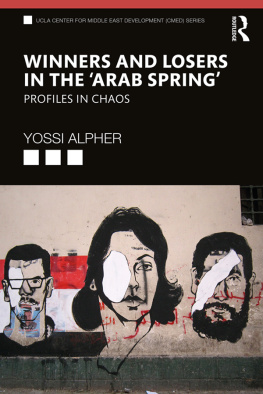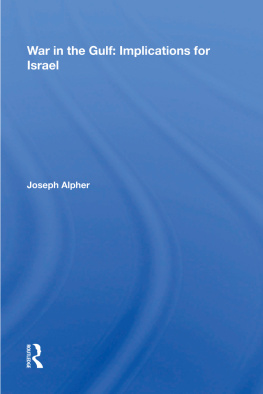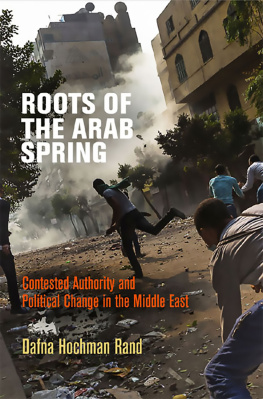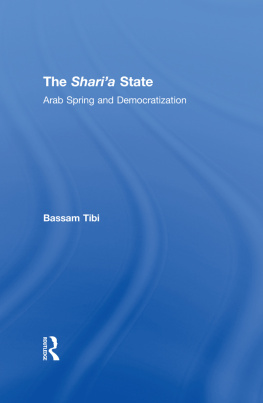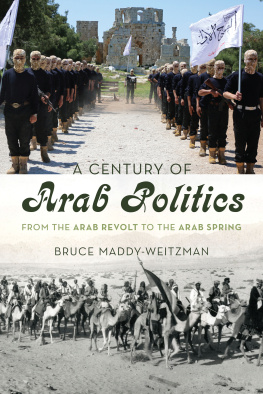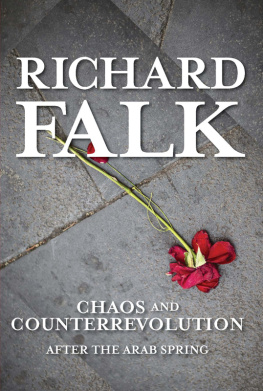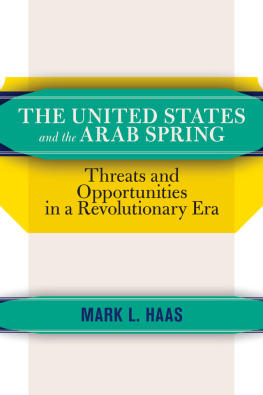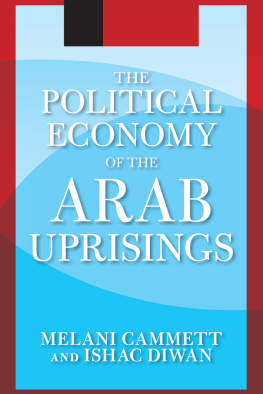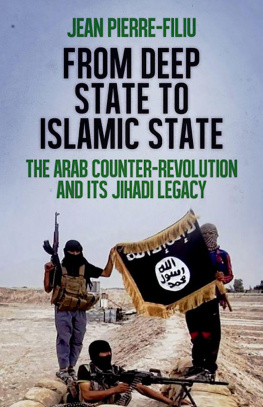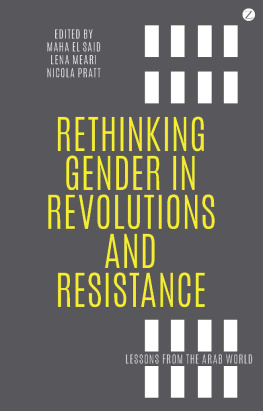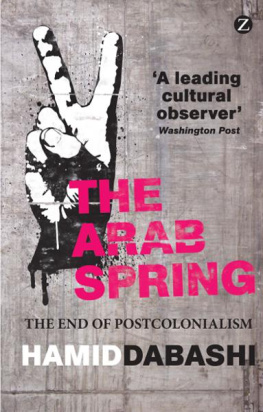Winners and Losers in the Arab Spring
This book looks at the way primarily external actors influenced and were influenced by the revolutionary chaos that erupted in the Arab Middle East in 2011. The Arab revolutions radically altered the Middle East dynamic and particularly the strategic standing of key actors, both locally and globally.
The winners are leaders with strategic understanding of the region and a scheme for exploiting the chaos Putin, Netanyahu and Irans Qasem Soleimani along with, strikingly, the very institution of Arab monarchy. The losers are the Arab autocrats who were deposed in Egypt, Libya and Yemen. The Palestinians, seemingly bypassed by the dynamic of Arab revolution, are also losers. So are the American presidents Bush 43 and Obama whose disastrous strategic decision-making catalyzed Arab state fragmentation and opened the gates of the Levant to Irans drive for regional hegemony. Western democratic society suffered too from waves of Islamist terrorism and the effects of Muslim migration generated at least in part by Arab chaos. Only in the case of two leaders was the jury still out by 2019. The effects of the high-risk policies of Saudi Arabias crown prince Mohamed bin Salman and the strategically incoherent policies of US President Trump remain to be seen.
Winners and Losers in the Arab Spring takes a global look at a massive regional upheaval that is far from over. It is an essential read for everybody interested in the Arab revolutions, Middle East and international strategic affairs.
Yossi Alpher is a former Mossad official and served in the Israel Defense Forces Intelligence. He was director of the Jaffee Center for Strategic Studies (today INSS) at Tel Aviv University. Now retired, he researches and writes about Middle East strategic issues. His book Periphery: Israels Search for Middle East Allies (2015), won two awards in Israel for best book in the security field.
UCLA Center for Middle East Development (CMED)
Series Editors
Steven Spiegel, UCLA
Elizabeth Matthews, California State University, San Marcos
The UCLA Center for Middle East Development (CMED) series on Middle East security and cooperation is designed to present a variety of perspectives on a specific topic, such as democracy in the Middle East, dynamics of Israeli-Palestinian relations, Gulf security, and the gender factor in the Middle East. The uniqueness of the series is that the authors write from the viewpoint of a variety of countries so that no matter what the issue, articles appear from many different states, both within and beyond the region. No existing series provides a comparable, multinational collection of authors. Thus, the series presents a combination of writers from countries who, for political reasons, do not always publish in the same volume. The series features a number of sub-themes under a single heading, covering security, social, political, and economic factors affecting the Middle East.
Contested Sites in Jerusalem
The Jerusalem Old City Initiative
Edited by Tom Najem, Michael J. Molloy, Michael Bell and John Bell
The Arab Gulf States and the West
Perceptions and Realities Opportunities and Perils
Edited by Dania Koleilat Khatib and Marwa Maziad
Winners and Losers in the Arab Spring
Profiles in Chaos
Yossi Alpher
For more information about this series, please visit: www.routledge.com/middleeaststudies/series/CMED
Winners and Losers in the Arab Spring
Profiles in Chaos
Yossi Alpher
First published 2020
by Routledge
2 Park Square, Milton Park, Abingdon, Oxon OX14 4RN
and by Routledge
52 Vanderbilt Avenue, New York, NY 10017
Routledge is an imprint of the Taylor & Francis Group, an informa business
2020 Yossi Alpher
The right of Yossi Alpher to be identified as author of this work has been asserted by him in accordance with sections 77 and 78 of the Copyright, Designs and Patents Act 1988.
All rights reserved. No part of this book may be reprinted or reproduced or utilised in any form or by any electronic, mechanical, or other means, now known or hereafter invented, including photocopying and recording, or in any information storage or retrieval system, without permission in writing from the publishers.
Trademark notice: Product or corporate names may be trademarks or registered trademarks, and are used only for identification and explanation without intent to infringe.
British Library Cataloguing-in-Publication Data
A catalogue record for this book is available from the British Library
Library of Congress Cataloging-in-Publication Data
Names: Alpher, Joseph, author.
Title: Winners and losers in the Arab Spring : profiles in chaos / Yossi Alpher.
Description: Milton Park, Abingdon, Oxon ; New York, NY : Routledge, 2019. | Series: UCLA Center for Middle East Development (CMED) series ; 16 | Includes bibliographical references and index.
Identifiers: LCCN 2019010390 (print) | LCCN 2019014156 (ebook) | ISBN 9780429276712 (Ebook) | ISBN 9781000020274 (Adobe Reader) | ISBN 9781000020595 (Epub) | ISBN 9781000020434 (Mobipocket) | ISBN 9780367227524 | ISBN 9780367227524 (hardback) | ISBN 9780367227531 (pbk.) | ISBN 9780429276712 (e-book)
Subjects: LCSH: Arab Spring, 2010 | Arab countriesPolitics and government21st century. | Arab countriesForeign relations21st century. | Arab countriesForeign relationsUnited States. | United StatesForeign relationsArab countries.
Classification: LCC DS39.3 (ebook) | LCC DS39.3 .A45 2019 (print) | DDC 909/.097492708312dc23
LC record available at https://lccn.loc.gov/2019010390
ISBN: 978-0-367-22752-4 (hbk)
ISBN: 978-0-367-22753-1 (pbk)
ISBN: 978-0-429-27671-2 (ebk)
Cover photo from the injured murals series, 2011, by citizen journalist Gihan (Gigi) Ibrahim.
Typeset in Bembo
by Apex CoVantage, LLC
Contents
PART I
Abetting the chaos: western losers
PART II
Reaping the benefits: local winners
PART III
Conclusion: understanding a global grand strategic event
The idea of this book began cautiously to take shape around 2014 with a timeline of what I dubbed Arab chaos, and which readers can still find (updated through 2018) at the end of the manuscript. As a course of multiple revolutionary events developed the length and breadth of the Middle East, I frequently found myself starting anew and asking again what it is that this chronicle of chaos is trying to tell me. Conceptualization and structuring of a final descriptive and analytical product took long months and years and involved endless permutations, consultations and rethinking.
Many colleagues in Israel, the Arab world and elsewhere contributed to this effort through their writings and conference presentations. A special thanks is due to Bruce Maddy-Weitzman, professor of history of the modern Middle East and North Africa at Tel Aviv University. Bruce read an early draft manuscript and offered a multitude of comments, corrections and editorial ideas that proved invaluable.
Roger Parkinson, old friend and veteran newspaper publisher in Canada and the US, read the opening sections at a critical juncture in my writing and provided spot-on advice for rendering the manuscript more readable and compelling.

